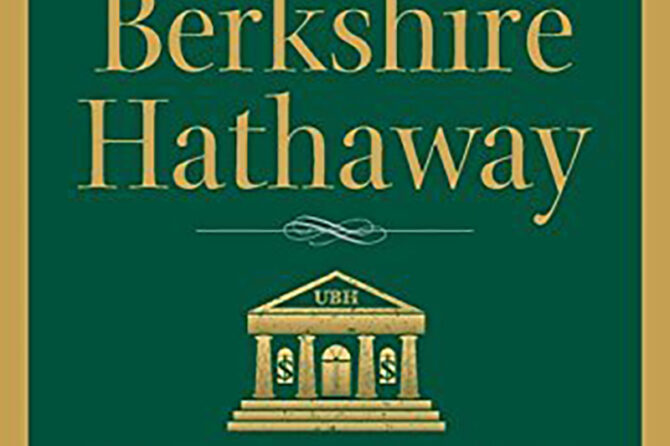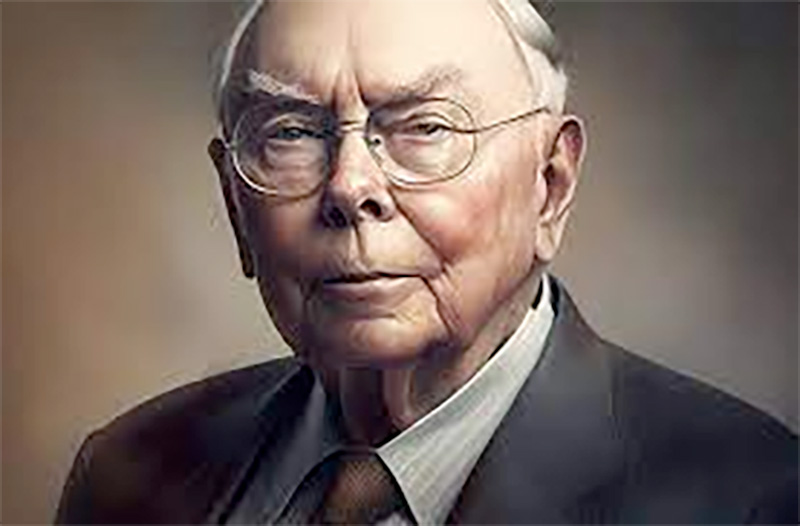
Charlie Munger is no more. His demise at the age of 99 is not just the end of a person; it is the end of a legacy. A legacy that he built alongside Warren Buffett will be remembered forever in the financial world. At this juncture, I fondly remember my third audiobook, “University of Berkshire Hathaway: 30 Years of Lessons Learned from Warren Buffett & Charlie Munger at the Annual Shareholders Meeting,” authored by Daniel Pecaut and Corey Wrenn. This wasn’t just any book on investing; it was a journey through three decades of wisdom from the Oracle of Omaha, Warren Buffett, and his equally sagacious partner, Charlie Munger.
The book, as narrated, unfolds like a grand narrative, weaving together the annual gatherings of Berkshire Hathaway shareholders. From a humble beginning with a mere handful of attendees to a colossal event drawing tens of thousands, these meetings transformed into something akin to a capitalist’s pilgrimage. Pecaut and Wrenn, through their meticulous note-taking over the years, have distilled the essence of these meetings into 30 concise chapters. Each chapter is a goldmine of insights, not just about investing, but about business acumen, life, and the economy.

One of the most striking aspects of the book is its portrayal of Warren Buffett and Charlie Munger not just as investors but as storytellers, educators, and sometimes, philosophers. Their approach to investment, laced with wit, wisdom, and a touch of humour, makes the book a delightful listen. Whether it was Buffett using a Woody Allen quote to elucidate a point or Munger’s scathing yet humorous take-downs of conventional theories like the efficient market hypothesis, each anecdote and analogy was both entertaining and enlightening.
Buffet’s right-hand man, Charlie Munger’s investment philosophy, which emphasizes a holistic and ethical approach to decision-making, deeply resonated with me. His lessons on understanding the business, focusing on quality, and the importance of patience and discipline are foundational to successful investing. Munger consistently advocated against leverage and stressed the significance of risk management through a margin of safety. Furthermore, his approach of integrating multiple disciplines to inform investment decisions highlights the necessity of clear, rational thinking in the investment world. These teachings go beyond mere investment strategies; they are about cultivating a comprehensive worldview, making Munger a highly respected and revered figure in the investment community. Here are some key investment lessons gleaned from Charlie Munger’s philosophy:

Understand the Business: Munger advocates for investing in businesses that you thoroughly understand. This means having a deep knowledge of the business model, industry, and competitive landscape.
Focus on Quality: He emphasizes investing in high-quality companies with a strong competitive advantage, good management, and a track record of solid performance. This often means choosing companies that are leaders in their industries.
Be Patient and Disciplined: Munger believes in the virtue of patience in investing. He advises against frequent trading and suggests that good investments will pay off in the long run. It’s about waiting for the right opportunity and not reacting to market fluctuations.
Avoid Leverage: He warns against the use of excessive leverage. Using borrowed money to invest can amplify gains, but it can also magnify losses, potentially leading to financial ruin.
Risk Management: Munger stresses the importance of understanding and managing risk. He advocates for a margin of safety in investments, ensuring that even if things go wrong, the impact on your overall portfolio is manageable.
Learn from Mistakes: He believes in the importance of learning from past mistakes – both your own and those of others. Reflecting on errors and understanding what went wrong is crucial for becoming a better investor.
Diversification vs. Concentration: While traditional advice often focuses on diversification to reduce risk, Munger, like Buffett, believes in a concentrated portfolio of high-confidence investments. He suggests that “wide diversification is only required when investors do not understand what they are doing.”
Integrate Multiple Disciplines: Munger is famous for his approach of using a “latticework of mental models” drawn from various disciplines – economics, psychology, mathematics, and more – to inform his investment decisions.
Long-Term Oriented: He advocates for a long-term perspective on investment. Short-term market trends and noise should not distract investors from their long-term investment goals.
Simplicity over Complexity: Munger often advises keeping investment strategies simple and understandable rather than complex and difficult to manage.
The book doesn’t shy away from discussing the missteps and blunders in Berkshire Hathaway’s journey. The candid admission of mistakes, such as the investment in Dexter Shoes or the missed opportunity in Belridge Oil, adds a layer of authenticity and humility to the narrative. It’s a reminder that even the greatest investors are not infallible and that there’s value in recognizing and learning from one’s errors.
Buffett and Munger’s discussions on their investment principles are a masterclass in value investing. Their approach to buying wonderful businesses at fair prices, as opposed to fair businesses at wonderful prices, is a fundamental takeaway for any investor. The analogy of buying a farm, which simplifies the concept of assessing investment opportunities, was particularly striking. It underscored the importance of doing your own due diligence, a principle that Buffett and Munger exemplified through their decades of success.
The book also dives into broader topics like economics, politics, and social issues, reflecting the wide-ranging intellect of Buffett and Munger. Their views on issues like nuclear proliferation, technology, and executive compensation provide a window into how these great minds interpret and respond to global challenges and trends.
Perhaps what makes this audiobook truly special is its ability to encapsulate the essence of Buffett and Munger’s philosophy not just in their words but in the way those words are delivered. The narration is engaging, bringing to life the atmosphere of the annual meetings and the personalities of these two legendary figures.
In conclusion, “University of Berkshire Hathaway” is more than just a book on investing. It’s a compendium of life lessons, business strategies, and philosophical musings, all woven together by the enduring wisdom of Warren Buffett and Charlie Munger. For anyone interested in investing, this book is a treasure trove of knowledge. But beyond that, it’s a testament to the enduring power of clear thinking, ethical decision-making, and a relentless pursuit of knowledge. As I finished listening to the last chapter, I felt not just more knowledgeable about investing, but wiser about life.

Here are the top 10 Charlie Munger quotes that will forever resonate in my mind and, at the same time, immortalize him:
1. “Spend each day trying to be a little wiser than you were when you woke up.”
2. “The best thing a human being can do is to help another human being know more.”
3. “It is remarkable how much long-term advantage people like us have gotten by trying to be consistently not stupid, instead of trying to be very intelligent.”
4. “In my whole life, I have known no wise people who didn’t read all the time — none, zero.”
5. “I never allow myself to have an opinion on anything that I don’t know the other side’s argument better than they do.”
6. “The big money is not in the buying and selling, but in the waiting.”
7. “You don’t have to be brilliant, only a little bit wiser than the other guys, on average, for a long, long time.”
8. “The first rule is that you can’t really know anything if you just remember isolated facts and try and bang ’em back.”
9. “There are worse situations than drowning in cash and sitting, sitting, sitting.”
10. “The game of life is the game of everlasting learning. At least it is if you want to win.”
These quotes reflect Munger’s emphasis on continuous learning, rational decision-making, and a long-term perspective in investing and life.
Prof. Dr. Prahlada N. B
30 November 2023
Chitradurga.

















Prahlada Sir 🌻
Charlie Munger’s or Charles T Munger’s demise few days back , has for sure left a void in financial World. He was known in business world not only for his business acumen, but also for his wits & wisdom , & also for his awesome speeches in business meetings.
He was an investing genius & Vice-chair of Berkshire Hathaway.He was considered as right-hand man of Berkshire Hathaway Chairman, the famous Warren Buffett.While Buffet was the well known face of Berkshire, Charlie worked behind the scenes & relished obscurity.
Charlie Munger had studied mathematics, at the university of Michigan & later on had earned his ‘Juris Doctor degree’ from Harvard law school. Probably because of this background, his thinking was different & innovative, compared to others in the business field.
Munger was known for his value investing approach , focusing on long term investment in undervalued companies with strong competitive advantages.He used to emphasise the importance of understanding businesses & their industries, before making investment decisions.
Munger, who died only few days back, was only one month less to his 100th birthday 🥳. As rightly said by Analyst Ajay Bagga…..
Reply“ Charlie Munger, leaves behind a treasure trove of investment wisdom “ 💐👏
Dear Dr Prahlada sir,
ReplyThank you for the excellent post on Charlie Munger.
I have read latticework if mental models described by Charlie Munger and even few books in the duo of Munger and Buffett
Your post has aptly conveyed the importance of Munger for the average investor.
Thank you